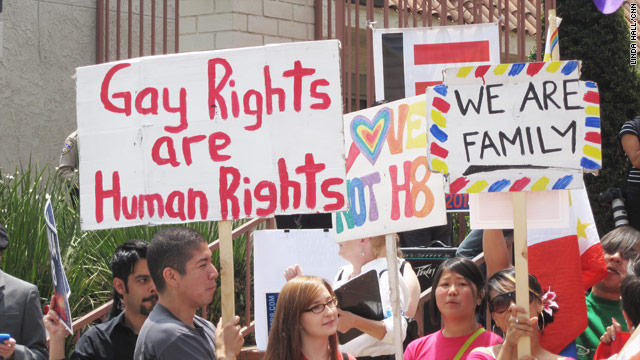Will Prop 8 ruling have an impact on other states?

- U.S. District Court Judge Vaughn Walker to rule on Proposition 8 trial
- The ballot initiative was approved by voters in California in 2008
- Legislative expert says no matter the ruling, states are unlikely to take up legislation
- The ruling will likely be appealed to an appeals court and the Supreme Court
Washington (CNN) -- While closing arguments have ended in California's Proposition 8 trial -- a case that will determine the constitutionality of California's same-sex marriage ban -- the outcome may not have an impact on states considering similar legislation.
The reason: State budget crises and the upcoming elections have shifted the focus from social issues to fiscal stability, which will sidetrack same-sex marriage legislation in other states, a policy expert said.
"I have also seen this issue pushed aside since the recession started. States are just so focused on budgets and the shortfalls," said Christine Nelson, a program director at the National Council of State Legislatures. "I had a legislator tell me 'Are you kidding? Our state needs money and job creation. So why in the world would we be tackling that?' "
Nelson, who follows the issue of same-sex marriage, said there's been very little legislative activity this year, which she attributes to a year where most legislators are up for re-election.
"I talked to advocates last fall and I said what are you expecting this session? And they said 'Oh, nothing, it's an election year' -- no one's going to touch these issues."
 Video: The Mormon Church vs. Prop 8
Video: The Mormon Church vs. Prop 8
After California's Legislature approved same-sex marriages and the state Supreme Court ruled they were legal, voters in November 2008 passed Proposition 8, banning them. In May 2009, the state's highest court upheld the ban, but allowed about 18,000 unions performed before the ban to remain valid.
Read more about Proposition 8 and same-sex marriage
Nelson said that while there could be a flurry of action by activists as a result of District Court Judge Vaughn Walker's decision, she doesn't expect anything substantial or noteworthy to come about politically.
"I don't see any real immediate response legislatively no matter what the Prop 8 decision looks like," she said. "In some cases, what legislators can do is start the ball rolling. But that doesn't necessarily mean that there's going to be any real immediate consequence to it."
Five states and the District of Columbia allow for same-sex marriage. Other states have civil union laws.
But for 30 states, Nelson said, it will be next to impossible to get legislation on the table because those states have the Defense of Marriage Act on the books. Enacted by Congress in 1996, the act bars federal recognition of same-sex marriage and allows states the right to do so.
CNN Special Report: Gay in America
Since 1996, several states have put into place legislation that prohibits same-sex marriages or "the recognition of same-sex marriages formed in another jurisdiction," according to the National Council of State Legislatures.
The issue heated up in 2003 when Massachusetts' Supreme Court approved same-sex marriage. The decision led to a firestorm among conservatives and became an issue in the 2004 presidential election.
Legal options
The Proposition 8 case is being dubbed in legal circles as this generation's Brown v. Board of Education, the case that outlawed segregation in schools. It also closely echoes the Supreme Court case that overturned bans on interracial marriage.
An appeal to the Supreme Court on the case is all but guaranteed by the losing side, but it would go first to the 9th Circuit U.S. Court of Appeals in San Francisco, considered the most liberal federal appeals court.
An issue the defendants could use if the law is overturned is what legal standard was applied in the case.
Maria Blanco, the executive director of the Chief Justice Earl Warren Institute on Race, Ethnicity & Diversity at the University of California, Berkeley, said the court right now is looking at this as a rational basis test.
Judges utilize this legal method to examine whether a law is arbitrary or had a reasonable and rational basis for being created. It is most often seen in cases where the plaintiffs claim their equal protection rights under the Constitution were taken away.
"Let's say the plaintiffs survive and win [in this case] and they win on a rational basis, I'm sure the defendants would appeal and say they didn't meet the rational basis test ... or could appeal by saying the court used the wrong standard," she said.
But even if the plaintiffs win, gays and lesbians might not yet be able to get married in the state.
"There probably won't be an immediate impact. The first thing the defendants would do is to go to court to get a stay pending appeal. I'm pretty sure they'd get it."
The fight over Proposition 8 has been a long and grueling struggle for advocates and opponents.
"It does not weaken the fabric of our communities to grant them these basic familial rights -- it strengthens them," said Chad Griffin, president of the American Foundation for Equal Rights, when the lawsuit was announced in May. "It does not undermine marriage to extend it to these loving couples -- it affirms it."
Andrew Pugno, a lawyer for Protect Marriage, the group that came up with Proposition 8, said he believed the issue was over when Californians went to the polls.
"Seven million Californians voted to preserve or restore what marriage has meant since the beginning of time," he said. "If they're not permitted to do something as basic as that, then there's something, really something, wrong with our system."
CNN's Mallory Simon, Dan Simon and William Mears contributed to this report.
